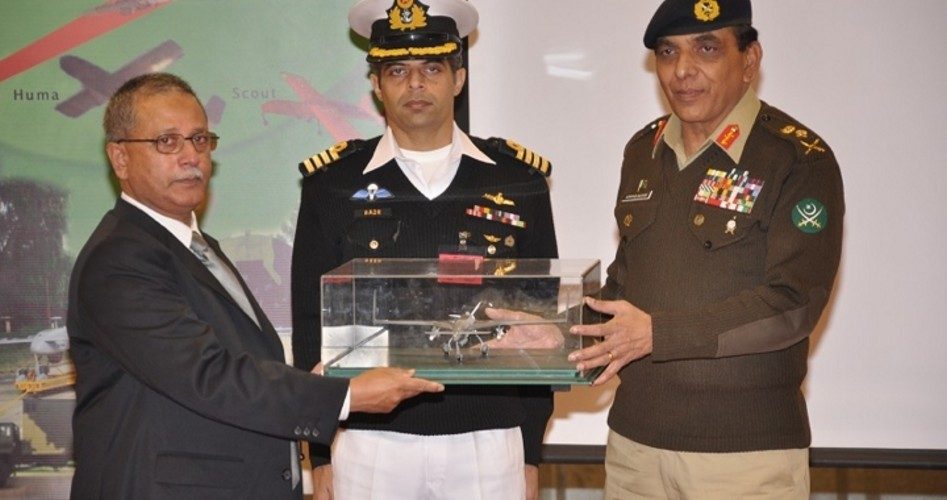
Following a weekend of protests in Pakistan over U.S. drone strikes, the Kabul government revealed that its military has developed new drones of its own, the Washington Post reported Monday. The drones are unarmed and will be used for surveillance, according to the nation’s military officials, who nonetheless issued a statement describing the Strategically Unmanned Aerial Vehicles as “a landmark and a historic event, wherein a very effective force multiplier has been added to the inventory of the armed forces.”
According to Muhammad Saad, a former senior officer in the Pakistani military, the country already has more limited drones for reconnaissance, with a range of about six miles. The newer models, called Burraq and Shapar, are said to have a range of 75 miles and will be more useful in “collecting of more operational intelligence” that could help guide helicopter gunships and fighter jets to specific targets, Saad said. The Post cited Saad and other sources as saying that Pakistan is still years away from being able to develop armed drones. “Still, Monday’s announcement is likely to unnerve Pakistan’s neighbors, including India and Afghanistan,” the Post reported.
Demonstrators on Sunday attempted to stop trucks carrying NATO troop supplies through northwest Pakistan into Afghanistan, where U.S. and other NATO forces have been at war with the Taliban and other insurgents for the past 12 years. About 100 protestors on the outskirts of Peshawar, capital of the Khyber Pakhtunkhwa province, approached trucks stopped at a toll booth, checked documents, and “roughed up drivers,” the Associated Press reported. One driver, Gul Zaman, said he told the crowd he was carrying commercial goods, not NATO supplies, but was dragged out of the truck by some of the demonstrators.
“Without waiting for me to take my documents out of the glove compartment, they dragged me out,” he told the AP. “We are also concerned about drone attacks, but they shouldn’t come down heavy on us like this.”
According to the New York Times, NATO trucks do not operate on weekends. A spokesman for the Pakistani Taliban praised the protest, the Times reported, while Pervaiz Rashid, the Pakistani information minister, called it a farce.
The action followed a rally on Saturday when an estimated 10,000 to 13,000 flag-waving demonstrators gathered at Peshawar to protest U.S. drone strikes in Pakistan. Politician and cricket star Imran Khan, leader of the Tehreek-e-Insaf party, said his followers would block NATO troop supplies. “There can be no peace unless drones are stopped,” Khan told the crowd, while challenging Prime Minister Nawaz Sharif to stand up to the United States. “We will put pressure on America, and our protest will continue if drone attacks are not stopped,” he said.
Drone attacks have frequently been a source of tension between the United States and Pakistan. The Pakistani government blocked the NATO supply routes for seven months following U.S. air strikes that accidentally killed two dozen soldiers on the Afghan border in November 2011. Pakistan finally reopened the routes after the United States apologized.
But while the Kabul government has publicly called for an end to the drone strikes, it has for years endorsed them privately as a means of combating the Taliban in Pakistan. Former Pakistani President Pervez Musharraf asked President George W. Bush for the drone technology after the United States began employing drone strikes in the war on terror that followed the September 11, 2001 attacks on New York and Washington, D.C. The United States turned down the request, and Pakistan began efforts to develop drones of its own.
Imran Khan and Interior Minister Nisar Ali Khan claim the government was on the verge of entering peace talks with the Taliban insurgents when a U.S. missile killed Taliban leader Hakimullah Mehsud, a strike they say has jeopardized the chances for peace.
Pakistan soldiers and Taliban leaders are not the only ones killed by the drone strikes. The Bureau of Investigative Journalism has reported that a drone-launched missile on November 21 struck a religious school in Hangu, killing six and injuring several others. The strike is believed to be the first outside the Federally Administered Tribal Area bordering Afghanistan where large numbers of militant groups reside alongside a civilian population. According to the BIJ statistics, drone strikes have killed more than 2,500 in Pakistan during the past 10 years, including somewhere between 416 and 948 civilians.



